The art of the fix: How luggage repairers save your travel companion
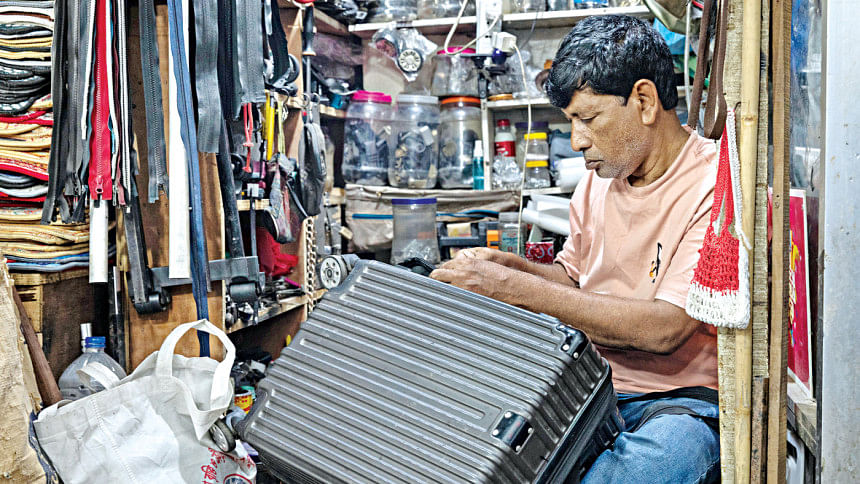
There is something comforting about that familiar zip, the reassuring click of a sturdy wheel rolling across a polished airport floor, the reassuring heft of your suitcase as you navigate new cities and distant horizons. For many of us, luggage is more than a box on wheels; it is a trusted companion on every journey, bearing witness to the last-minute changes we make before chasing sunsets in Cox's Bazar or the steep terrains of Sajek or the confusing dwelling we make after landing abroad.
But what happens when that trusty companion is damaged? When its wheel chews up pavement or its shell cracks under airline baggage handling? The telescopic handle buckles under the weight of last‑minute souvenirs. The seam gives way after one too many hasty zip‑ups. Often, our first instinct is to discard the damaged luggage and buy a new one which is an impulse that, beyond the expense, sits uncomfortably against the pleasures of nostalgia, thrift and sustainability.
Thankfully, across Dhaka and in many corners of the world, there exists a small army of skilled artisans who specialise in breathing new life into battered suitcases and weary backpacks. These are the luggage repairers, custodians of travel memories, who can restore your damaged case within hours, often for a fraction of the cost of replacement.
Their small dusty workshops are lifelines for travellers. Every workstation has a human tale behind it, one of self‑taught expertise, intergenerational craftsmanship and modern entrepreneurship.
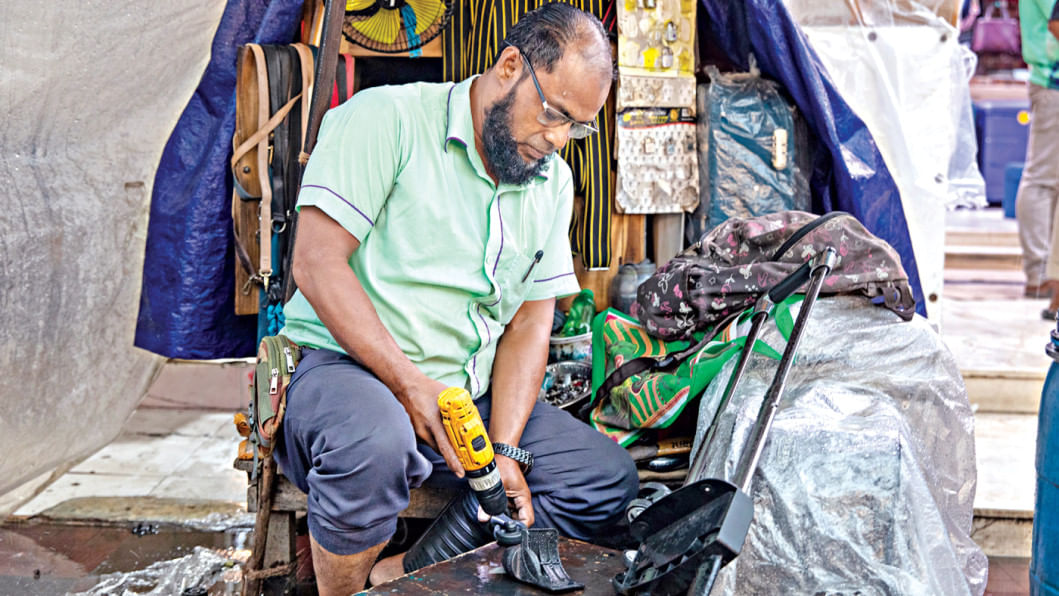
THE SELF‑TAUGHT MAESTRO OF LUGGAGE REPAIRING
On any given day at New Market in Dhaka, among the cacophony of chatter and calls from street vendors, you might spot small, open-fronted workshops with no glossy signage, no air‑conditioning but these are where the magic of luggage repair unfolds day after day.
One such stall belongs to Md Joynal Abedin, a self‑taught maestro of the mended suitcase. Joynal is quick to show you his toolkit which includes various types of zippers, replacement wheels in neat rows, sturdy handles waiting to be refitted. But his story did not begin here.
"I worked at President, the luggage company, for more than 20 years," Joynal recalled, carefully replacing a broken wheel. "At first, I did repairs part‑time alongside my job there. About ten years ago, I decided to make it my full‑time work," he added.
Joynal's decision was not one born of luxury but of love for the craft, and for his family. His eldest son now works for the very same President company where Joynal began, while another studies at the Dhaka University and the youngest attends primary school. His income of around Tk 70,000 per month supports their education and daily needs.
"Travellers bring their suitcases, sometimes broken in three places," Joynal said with a smile. "Fixing a crack might cost Tk 200 to over Tk 500. Wheels range from Tk 600 to over Tk 1,000. A wash is about Tk 500 to Tk 600. And if you need the zip chain repaired, it's Tk 50 to Tk 110 but for a full chain replacement it's around Tk 300 to over Tk 500," he added.
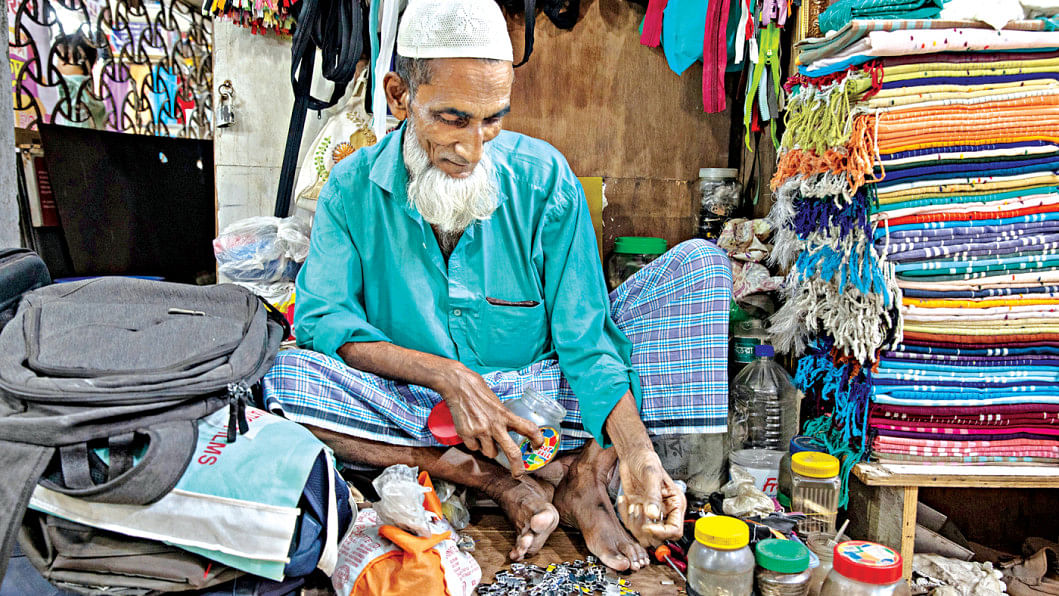
However, the price of fixing luggage may vary depending on quality and effort, Joynal said. Such prices, he argued, are small in comparison to the cost of a new suitcase and far kinder to our planet as repairs make luggage sustainable instead of ending up in landfills.
Nearby, in a quieter corner of the market, sat Akbar Khalifa also known as Farid Khalifa, a veteran in the craft. His weathered hands, traced with lines like vines of memory, moved with precision as he fixed a zipper on a bag. His eyes lit up as he spoke of distant Karachi, the place where his journey began.
Recalling about his past life, Farid said, "I came to Bangladesh from Karachi, Pakistan a long time ago. I used to work in a factory which used to manufacture suitcases made of leather. After the closure of that factory, I ended up working alone to support my family."
Regarding his family, Farid mentioned that his eldest son is a teacher at a local school. "I am just counting my last few days," said the 72-year-old with a smile on a wrinkled face full of white beard.
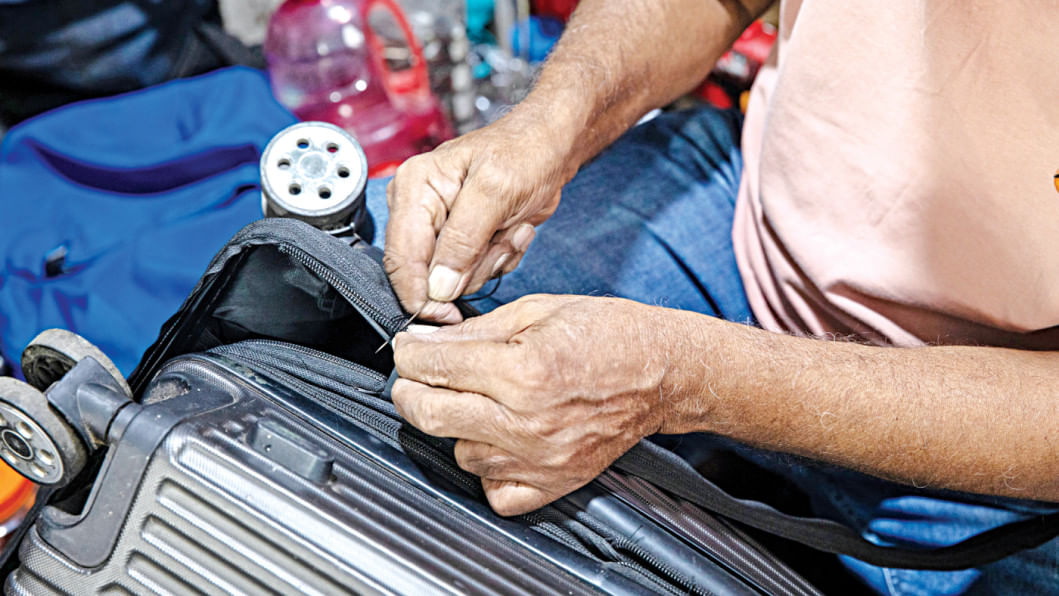
WHERE TRADITION MERGES WITH TECH
If Joynal and Farid represent the enduring heart of the trade, then Tusher, founder of "A to Z Bag Repair", embodies its modern evolution. Tusher, a second‑generation repairer who has stitched tradition to technology, runs not one but four workshops in Dhaka's New Market, Lalbagh, New Super Market and Farmgate area. He is currently planning to build a new shop in Mirpur.
Tusher has embraced social media to transform the old‑fashioned trade into a modern SME (Small and Medium Enterprise). Unlike traditional luggage repairing businesses, which are mostly in-person, he has made a strong social media presence through which he markets most of his services online.
"I have a home service where my team goes to the houses of clients and fix their luggage for a Tk 200 extra service charge. I get around 20 orders per day with a surge before the time of Hajj. Almost 80 percent of my clients currently come from online," Tusher said.
Regarding his services, Tusher said, "People can make any queries with me over the phone for consultation. I bring repairing equipment and parts of luggage from China. Depending on the quality there are several options available in my stores."
Dubbed as "professor" for his expertise in repairing luggage, Tusher said employee satisfaction is key to the success of his business.
"My employees get from Tk 8,000 to Tk 12,000 salary with profit sharing options which keeps them honest and happy. My cousins are also involved in the business with me."
For Tusher, it is a family business as he took over his father Abdur Rob's business of luggage repairing back in 2013. Abdur Rob has been in the luggage repairing business since 1976. In 2018, Tusher went online on Facebook with a page alongside the in-person shops.
Abdur Rob, with over 40 years of experience in luggage repairing still sits in the "A to Z Bag Repair" outlet in Dhaka's New Market from 11:00am to 8:00pm.
The over 65-year-old Abdur Rob from Old Dhaka described how he has seen young individuals entering into the trade of repairing luggage.
"I trained dozens of young people here," he said. "On average, it takes us two to three hours to mend a case properly."
"Repairing luggage is simple work, but good service is always a challenge," Abdur Rob said, adjusting a full chain until it closes with perfection. "Cobblers can fix a suitcase, yes, but their repairs rarely last. Our expertise is in making it last for years."
"A lock might cost Tk 150, or it could be over a thousand," he said. "A cheap suitcase needs cheap parts, but premium bags deserve the best materials if you want them to last."
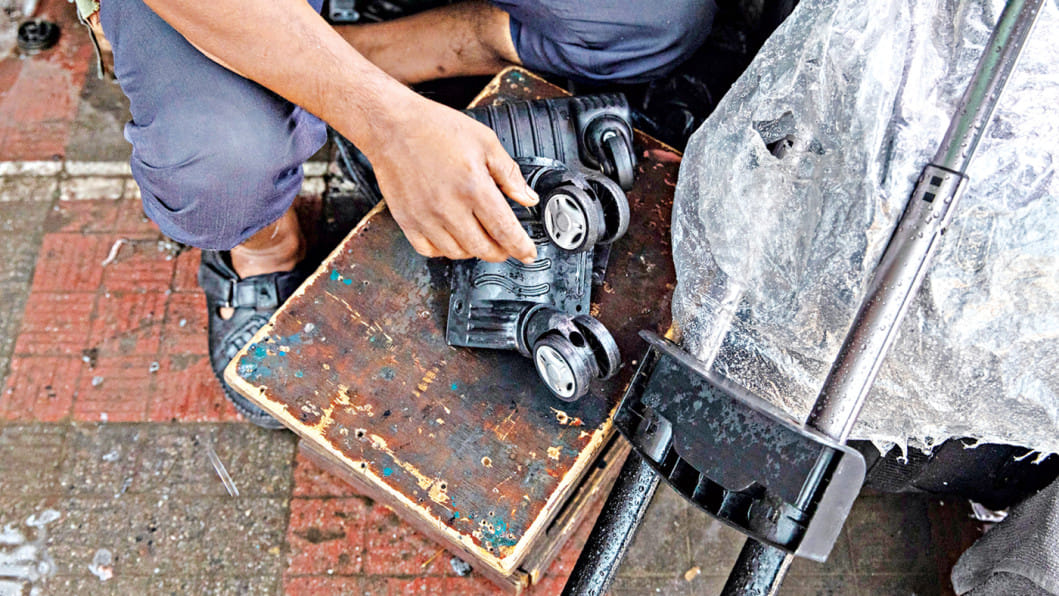
MORE THAN JUST REPAIRS
Luggage repair is an art that marries metalwork, leathercraft, engineering and empathy. It requires knowing how to splice a broken handle without weakening the frame alongside how to extract a torn zip without stressing the fabric, and how to rebalance a pair of wheels to glide evenly over lumps of cobble and airport tiles alike.
Walking through these alleys, watching Joynal oiling a revolving wheel or Farid threading a new zipper or Abdur Rob making a swift full chain change, is to glimpse the beating heart of Bangladesh's small‑business spirit. These artisans do more than fix cases as they sustain livelihoods, preserve memories and challenge the throw away culture that seems to sweep so effortlessly across our globe.
Consider the young traveller who set off for a weekend in Cox's Bazar only to find a wheel shattered on arrival, their beachside photos still on micro‑SD, but their suitcase compromised. A visit to the repairer's workshop restored both their case and heart, reminding the individual that we do not always need to discard what is broken. Sometimes, we merely need a skilled hand to set it right.
So, next time your trolley wheel shudders, your handle jams or your zip gives way, pause and consider these artisans and their patient hands, waiting in their modest workstations to repair what you treasure. For a few hundred takas, you can reclaim not only an object but a vessel of nostalgia, ready to roll onwards into your next adventure.
After all, a luggage is not just a luggage. It is a friend that carries hopes, dreams and footprints across the world alongside you. And like any true friend, it deserves a second chance. So, instead of delivering them to the landfill, bring it to one of the repairers, and let the art of the fix keep your memories on the move.

 For all latest news, follow The Daily Star's Google News channel.
For all latest news, follow The Daily Star's Google News channel. 



Comments